CarMax Bundle
Can CarMax Continue to Dominate the Used Car Market?
CarMax, Inc. (NYSE: KMX) disrupted the automotive retail landscape with its customer-centric, no-haggle approach. From a single store in 1993, it has become the nation's largest used car retailer, employing over 30,000 associates by fiscal year 2025. This CarMax SWOT Analysis reveals the strategies behind its success and what lies ahead.
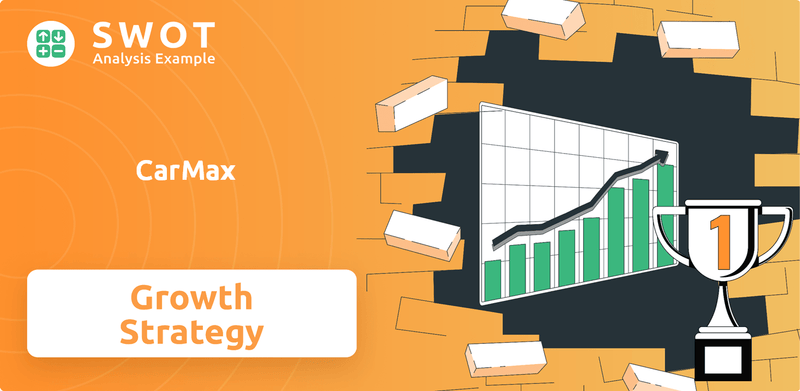
CarMax's omnichannel platform and commitment to customer satisfaction have been key to its success in the competitive used car market. This deep dive into CarMax's business model analyzes its strategic initiatives and growth opportunities. We'll explore CarMax's expansion plans, assess its financial performance, and consider the impact of automotive industry trends to understand the company's future prospects and long-term investment potential.
How Is CarMax Expanding Its Reach?
To understand the CarMax growth strategy and its future prospects, it's crucial to examine its expansion initiatives. The company is actively broadening its reach and diversifying its offerings to maintain its position in the competitive used car market. This strategy involves both increasing its physical presence and enhancing its service capabilities, reflecting a strong belief in the sustained growth of the automotive industry.
CarMax company analysis reveals a commitment to strategic growth. The company is investing significantly in expanding its operational capacity and optimizing its customer experience. This includes opening new stores and specialized facilities, such as reconditioning centers and auction facilities, to improve efficiency and accommodate more vehicle inventory.
In fiscal year 2025, CarMax opened five new stores and a stand-alone auction facility in Chino, California, along with a second stand-alone reconditioning center in Richland, Mississippi. For fiscal year 2026, the company plans to continue this expansion with six new stores and four stand-alone reconditioning/auction centers, with an estimated capital expenditure of approximately $575 million. These initiatives are designed to enhance operational efficiency and improve the overall customer experience, demonstrating confidence in the long-term growth of the used car market.
CarMax is increasing its physical footprint by opening new stores and specialized facilities. This expansion includes new stores, reconditioning centers, and auction facilities. These initiatives are designed to increase vehicle inventory and improve operational efficiency.
The company is expanding its services to become a one-stop shop for car-related needs. This includes exploring opportunities in financing options, insurance offerings, and extended warranties. This diversification aims to enhance customer convenience and increase revenue streams.
CarMax Auto Finance (CAF) is a key component of the growth strategy, focusing on expanding CAF penetration. This involves enhancing credit scoring models and leveraging non-prime securitization programs. In June 2024, CAF launched its first non-prime securitization deal to efficiently fund incremental originations.
CarMax is committed to becoming a leading retailer of used electric vehicles (EVs). This includes expanding hybrid and EV capabilities, enhancing store infrastructure, and establishing innovative EV-related partnerships. This strategic move aligns with the growing demand for EVs.
Beyond expanding its physical presence, CarMax is focusing on diversifying its services to become a comprehensive provider for all car-related needs. This includes exploring opportunities in financing, insurance, and extended warranties. CarMax Auto Finance (CAF) is a significant part of this strategy, with the company aiming to expand CAF penetration across the full credit spectrum by enhancing its credit scoring models and leveraging its non-prime securitization program. In June 2024, CAF launched its first non-prime securitization deal to efficiently fund incremental originations and support future growth in finance income. To learn more about the company's financial performance, you can read more from Owners & Shareholders of CarMax.
CarMax's expansion initiatives are designed to extend market reach and diversify offerings, focusing on physical store growth and service diversification. These strategies include opening new stores, enhancing financial services, and investing in electric vehicle capabilities.
- Opening new stores and specialized facilities to increase vehicle inventory and improve operational efficiency.
- Expanding financial services through CarMax Auto Finance (CAF) to enhance credit scoring models and leverage non-prime securitization programs.
- Investing in electric vehicle infrastructure and partnerships to become a leading retailer of used EVs.
- Focusing on customer satisfaction to maintain a competitive advantage in the used car market.
CarMax SWOT Analysis
- Complete SWOT Breakdown
- Fully Customizable
- Editable in Excel & Word
- Professional Formatting
- Investor-Ready Format
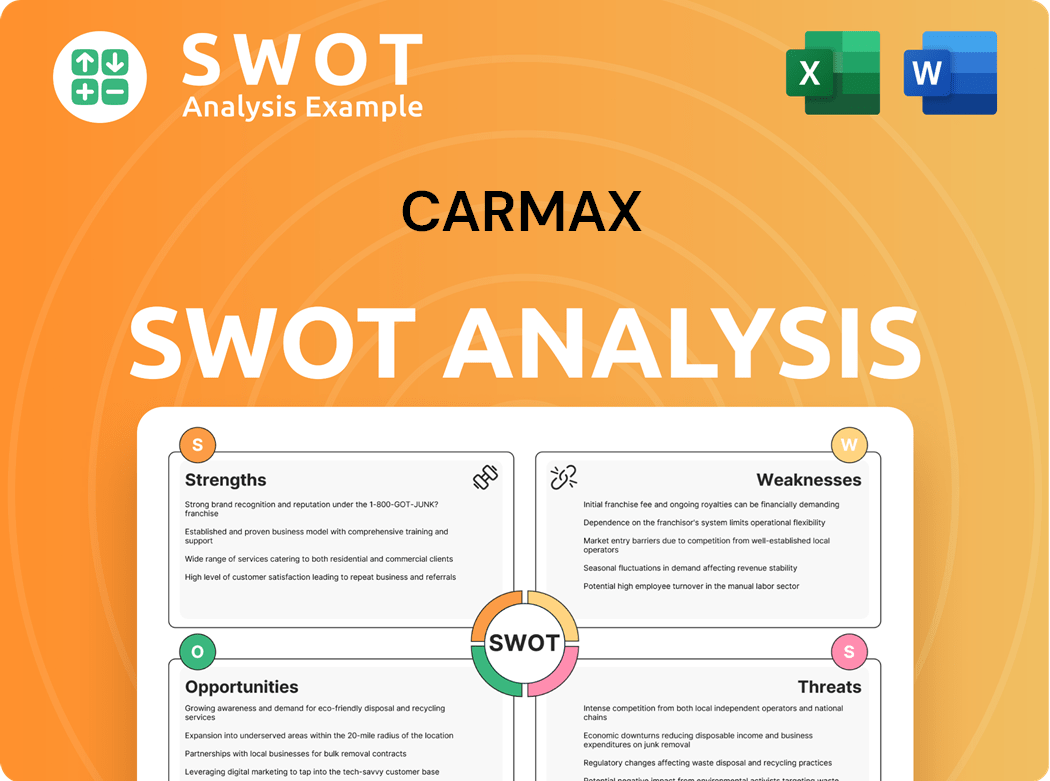
How Does CarMax Invest in Innovation?
The company's innovation and technology strategy is central to its CarMax growth strategy, focusing on digital transformation and enhancing customer experience. This approach allows customers to engage with the company through various channels, including online, in-store, or a combination of both. This omnichannel strategy is designed to meet the evolving needs of consumers in the used car market.
The company's commitment to technology is evident in its significant investments in data science, automation, and artificial intelligence (AI). These investments aim to improve operational efficiencies and provide a seamless experience for both buyers and sellers. By leveraging these technologies, the company strives to maintain its competitive edge within the automotive industry trends.
The digital-first approach allows customers to buy or sell a car entirely online, in-store, or through a combination of both. In fiscal year 2025, a significant 95% of customers engaged online before making purchases, and 70% completed their transactions using digital features. This highlights the success of the omnichannel approach.
The company uses data science and AI to improve operational efficiencies. AI-powered appraisals enhance customer experience and streamline logistics. This data-driven approach is a key component of the CarMax business model.
The wholesale auction platform has been enhanced with AI-enhanced vehicle condition reports and early bidding capabilities. Automated bills of sale streamline the process. These improvements contribute to the company's operational efficiency.
The virtual assistant, Skye, manages finance applications, vehicle transfers, and appraisal offers. This expansion has led to strong customer adoption and increased associate bandwidth. This enhances the CarMax online car buying experience.
The company prioritizes strong AI governance with an AI Center of Excellence. This center ensures responsible innovation and educates teams on the ethical use of AI. This focus helps maintain CarMax customer satisfaction reviews.
The company is focused on sustainability, with 65% of its total electricity consumption in 2024 derived from renewable sources. This represents a 62% increase over the prior year. These initiatives support the company's long-term goals.
The company is on track to reduce its Scope 1 and Scope 2 greenhouse gas emissions by 50% by 2025 compared to its 2018 baseline. It has already achieved a 33% decrease in 2024. This demonstrates the company's commitment to environmental responsibility.
The company's technology and innovation strategy positions it well for future growth. By focusing on digital transformation, data science, and sustainability, the company aims to enhance its competitive position. This includes a strong focus on responsible AI and environmental initiatives, which are key to the company's CarMax future prospects.
- Continued investment in AI and data analytics to improve customer experience and operational efficiency.
- Expansion of digital capabilities to meet evolving customer preferences.
- Focus on sustainability initiatives to reduce environmental impact and enhance brand reputation.
- Strategic use of data to inform decision-making and drive growth.
CarMax PESTLE Analysis
- Covers All 6 PESTLE Categories
- No Research Needed – Save Hours of Work
- Built by Experts, Trusted by Consultants
- Instant Download, Ready to Use
- 100% Editable, Fully Customizable
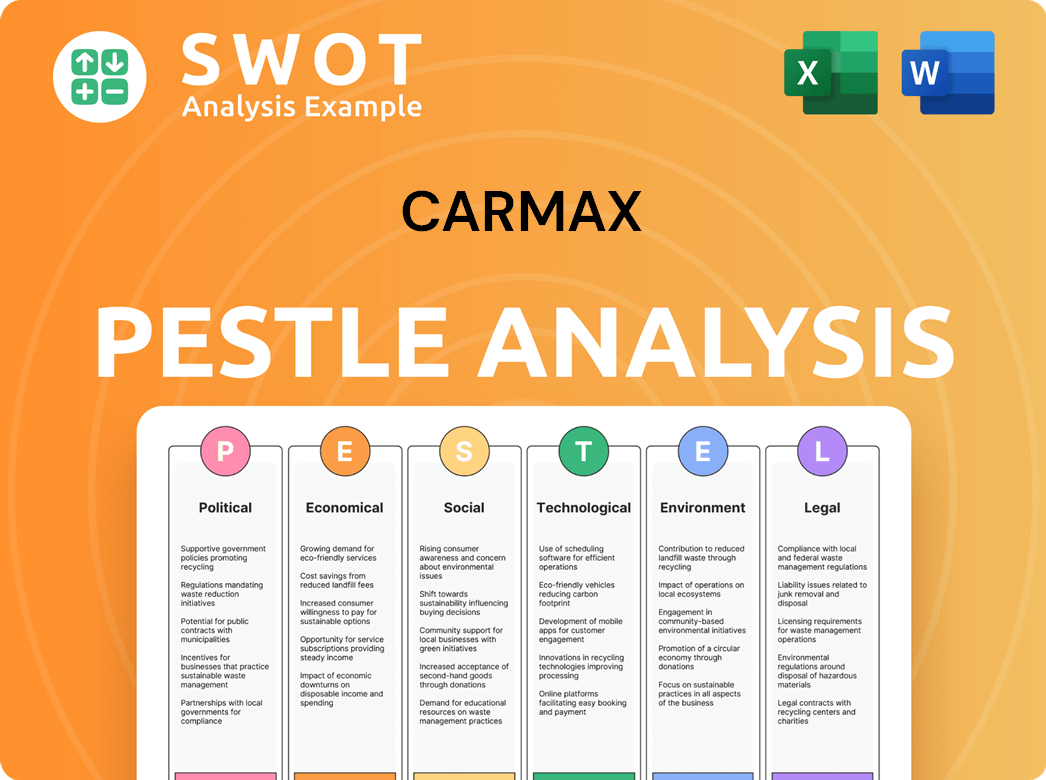
What Is CarMax’s Growth Forecast?
The financial outlook for CarMax is shaped by its recent performance and strategic plans. For fiscal year 2025, the company reported net sales and operating revenues of $26,353.4 million. Although there was a slight decrease in overall revenue, the company demonstrated growth in gross profit, driven by increased used vehicle sales and other revenue streams. This performance provides a foundation for future growth, supported by strategic initiatives and financial management.
CarMax's financial results for fiscal year 2025 show a mixed picture. While overall revenue saw a slight decrease, the company managed to increase its gross profit to $2,897.9 million. This was achieved through a focus on higher-margin used car sales and other revenue sources. Net earnings also increased, reaching $500.6 million, indicating the company's ability to maintain profitability despite market challenges. The financial data highlights the company's resilience and ability to adapt to market conditions, setting the stage for future expansion and strategic investments.
In the fourth quarter of fiscal year 2025, CarMax experienced significant improvements. Net revenues increased by 6.7% to $6.0 billion, and net earnings per diluted share rose by 81.3% to $0.58. CarMax Auto Finance (CAF) income also saw an increase, rising by 8.2% to $159.3 million. These positive results in the final quarter of the fiscal year suggest a positive trajectory for the company, with improved financial performance and strategic growth initiatives.
CarMax's growth strategy includes expanding its retail unit sales and increasing its CarMax Auto Finance (CAF) penetration. The company is focused on enhancing its online car buying experience and maintaining a strong presence in the used car market. This approach is designed to capitalize on automotive industry trends and strengthen its position against competitors.
In fiscal year 2025, CarMax achieved a gross profit of $2,897.9 million, a 6.8% increase. Net earnings per diluted share were $3.21, up 6.3% year-over-year. The fourth quarter of fiscal year 2025 saw a significant rise in net earnings per diluted share, increasing by 81.3% to $0.58. These figures demonstrate the company's ability to improve its financial performance.
CarMax anticipates double-digit earnings per share growth in fiscal year 2026, along with mid-single-digit retail unit expansion. The company plans to expand its CAF penetration by 100 to 150 basis points. These expansion plans are key to CarMax's future prospects, positioning it for continued growth in the used car market.
CarMax repurchased $428.5 million of its own shares during fiscal 2025 and has $1.94 billion remaining under its board authorization for share repurchases. The company maintains a $2 billion unsecured revolving credit facility and issues asset-backed term funding transactions to support CAF operations. These strategic initiatives support CarMax's long-term investment potential.
The financial performance of CarMax is characterized by several key metrics that highlight its growth and operational efficiency. These metrics are crucial for understanding the company's position in the Brief History of CarMax and its ability to navigate the competitive landscape.
- Net Sales and Operating Revenues: $26,353.4 million in fiscal year 2025.
- Gross Profit: $2,897.9 million, a 6.8% increase year-over-year.
- Net Earnings: $500.6 million in fiscal 2025, a 4.5% increase.
- Net Earnings Per Diluted Share: $3.21, up 6.3% year-over-year.
- CAF Income: An 8.2% rise to $159.3 million in Q4 FY25.
CarMax Business Model Canvas
- Complete 9-Block Business Model Canvas
- Effortlessly Communicate Your Business Strategy
- Investor-Ready BMC Format
- 100% Editable and Customizable
- Clear and Structured Layout
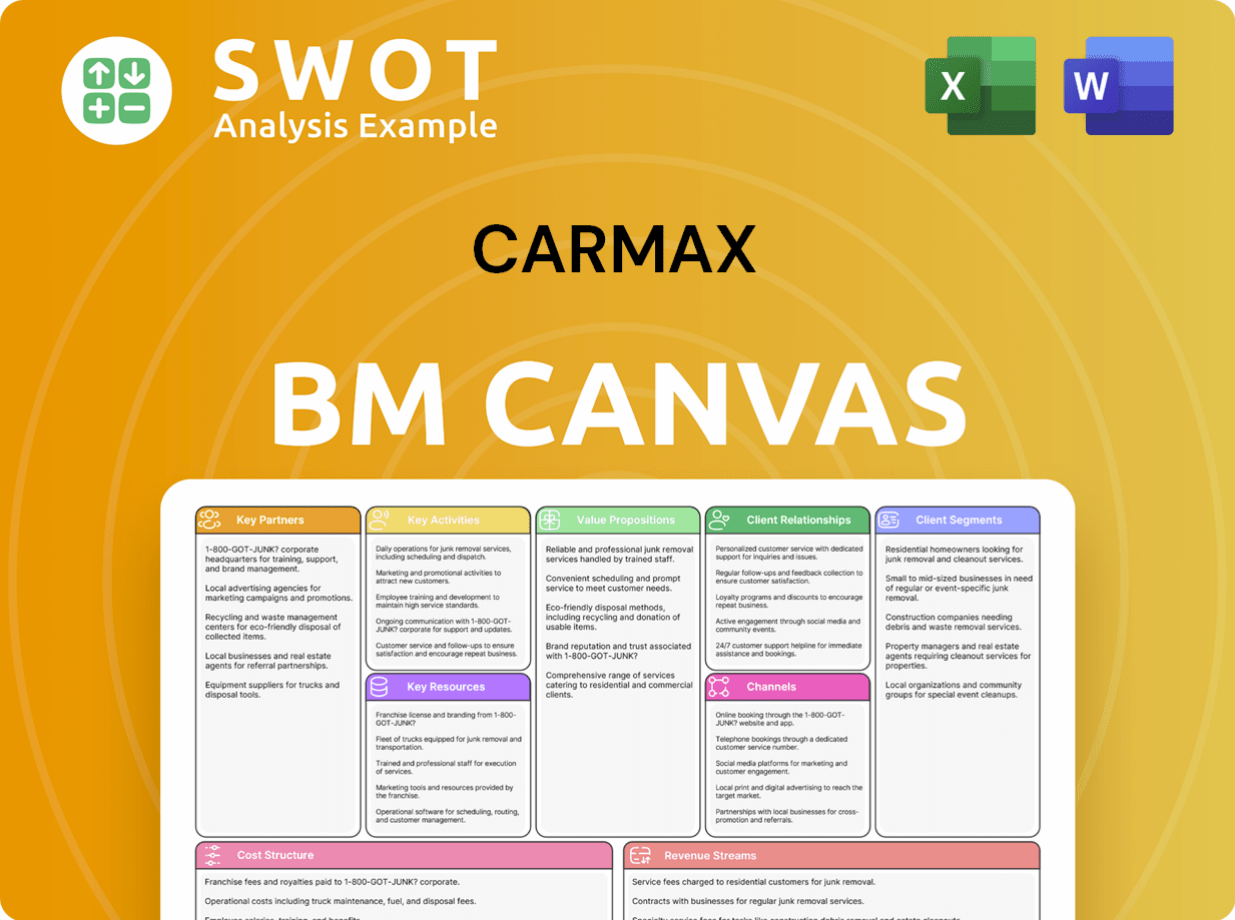
What Risks Could Slow CarMax’s Growth?
The path for CarMax's Mission, Vision & Core Values is not without its challenges. Several risks and obstacles could affect its growth strategy and future prospects. These include intense competition, economic volatility, and operational hurdles that must be navigated for continued success in the used car market.
One of the most significant challenges is the highly competitive landscape of the used car industry. This competition comes from various sources, including franchised dealerships, online platforms, and individual sellers. Furthermore, economic conditions and shifts in consumer behavior pose substantial risks. Factors such as inflation, interest rates, and economic downturns can significantly impact consumer demand and credit availability, affecting CarMax's financial performance.
Operational risks also play a crucial role in CarMax's future. The company must effectively manage its omnichannel platform and adapt to rapid technological changes, including AI and digital tools. Maintaining a strong reputation for integrity is also essential, as any event damaging this reputation could materially affect the business. Data privacy and security are also critical, as any breach could harm its reputation and result in significant costs.
The used car market is highly fragmented, with numerous players vying for market share. CarMax faces competition from franchised dealerships, independent used car dealers, online platforms, and private sellers. The increasing use of digital tools by competitors could impact CarMax's business model and margins.
Economic factors, such as inflation and interest rates, pose significant risks. Rising interest rates can increase the cost of auto financing, potentially dampening demand. The used car market's volatility, with fluctuating prices based on supply and demand, also presents a challenge for effective inventory management. A prolonged recovery period in the used vehicle market could lead to pressure on prices.
CarMax must effectively manage its omnichannel platform and adapt to rapid technological changes, including AI and digital tools. Maintaining a strong reputation for integrity is also crucial, as any event damaging this reputation could materially affect the business. The collection of sensitive customer information exposes the company to technology and data privacy risks, where any breach could harm its reputation and result in significant costs.
The used car market is subject to price fluctuations based on supply and demand. This volatility can impact CarMax's inventory management and profitability. Substantial inventory investments could become a liability if market conditions do not improve. The company's ability to manage inventory effectively is critical for its financial performance.
Rising interest rates can increase the cost of auto financing for consumers, potentially dampening demand for used cars. This can lead to tighter lending standards and increased loan losses for CarMax Auto Finance. The company's financial performance is sensitive to changes in interest rates.
Rapid technological changes, including the use of AI and digital tools by competitors, could disrupt CarMax's business model. The company needs to adapt quickly to these changes to maintain its competitive advantage. The ability to leverage technology effectively is crucial for CarMax's growth strategy.
CarMax addresses these risks through diversification, risk management frameworks, and by leveraging its diversified business model and digital capabilities. The company's ability to adapt to changing market conditions and technological advancements will be critical for its long-term success. CarMax's strategic initiatives include expanding its online presence and enhancing its customer experience.
In fiscal year 2024, CarMax's revenue was approximately $27.7 billion, and the company sold over 770,000 vehicles. The company's financial results are influenced by factors such as used car prices, sales volumes, and financing income. The company's ability to manage its inventory and control costs is crucial for maintaining profitability. CarMax's stock forecast and market share analysis are closely watched by investors.
CarMax Porter's Five Forces Analysis
- Covers All 5 Competitive Forces in Detail
- Structured for Consultants, Students, and Founders
- 100% Editable in Microsoft Word & Excel
- Instant Digital Download – Use Immediately
- Compatible with Mac & PC – Fully Unlocked
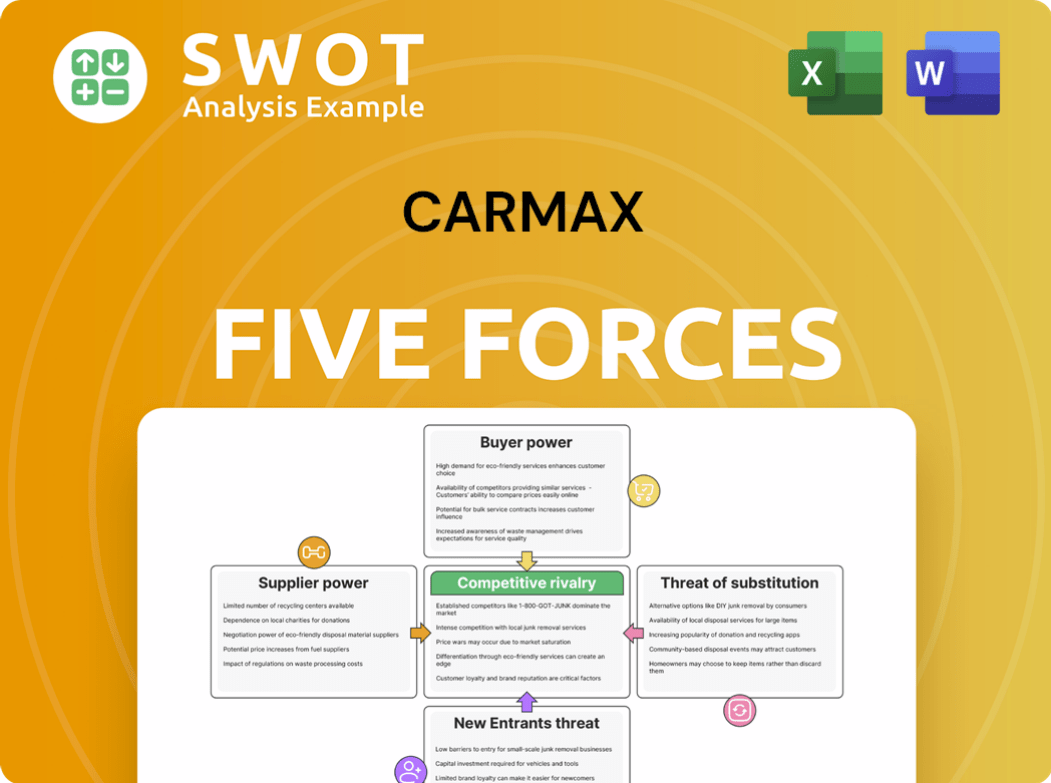
Related Blogs
- What are Mission Vision & Core Values of CarMax Company?
- What is Competitive Landscape of CarMax Company?
- How Does CarMax Company Work?
- What is Sales and Marketing Strategy of CarMax Company?
- What is Brief History of CarMax Company?
- Who Owns CarMax Company?
- What is Customer Demographics and Target Market of CarMax Company?
Disclaimer
All information, articles, and product details provided on this website are for general informational and educational purposes only. We do not claim any ownership over, nor do we intend to infringe upon, any trademarks, copyrights, logos, brand names, or other intellectual property mentioned or depicted on this site. Such intellectual property remains the property of its respective owners, and any references here are made solely for identification or informational purposes, without implying any affiliation, endorsement, or partnership.
We make no representations or warranties, express or implied, regarding the accuracy, completeness, or suitability of any content or products presented. Nothing on this website should be construed as legal, tax, investment, financial, medical, or other professional advice. In addition, no part of this site—including articles or product references—constitutes a solicitation, recommendation, endorsement, advertisement, or offer to buy or sell any securities, franchises, or other financial instruments, particularly in jurisdictions where such activity would be unlawful.
All content is of a general nature and may not address the specific circumstances of any individual or entity. It is not a substitute for professional advice or services. Any actions you take based on the information provided here are strictly at your own risk. You accept full responsibility for any decisions or outcomes arising from your use of this website and agree to release us from any liability in connection with your use of, or reliance upon, the content or products found herein.